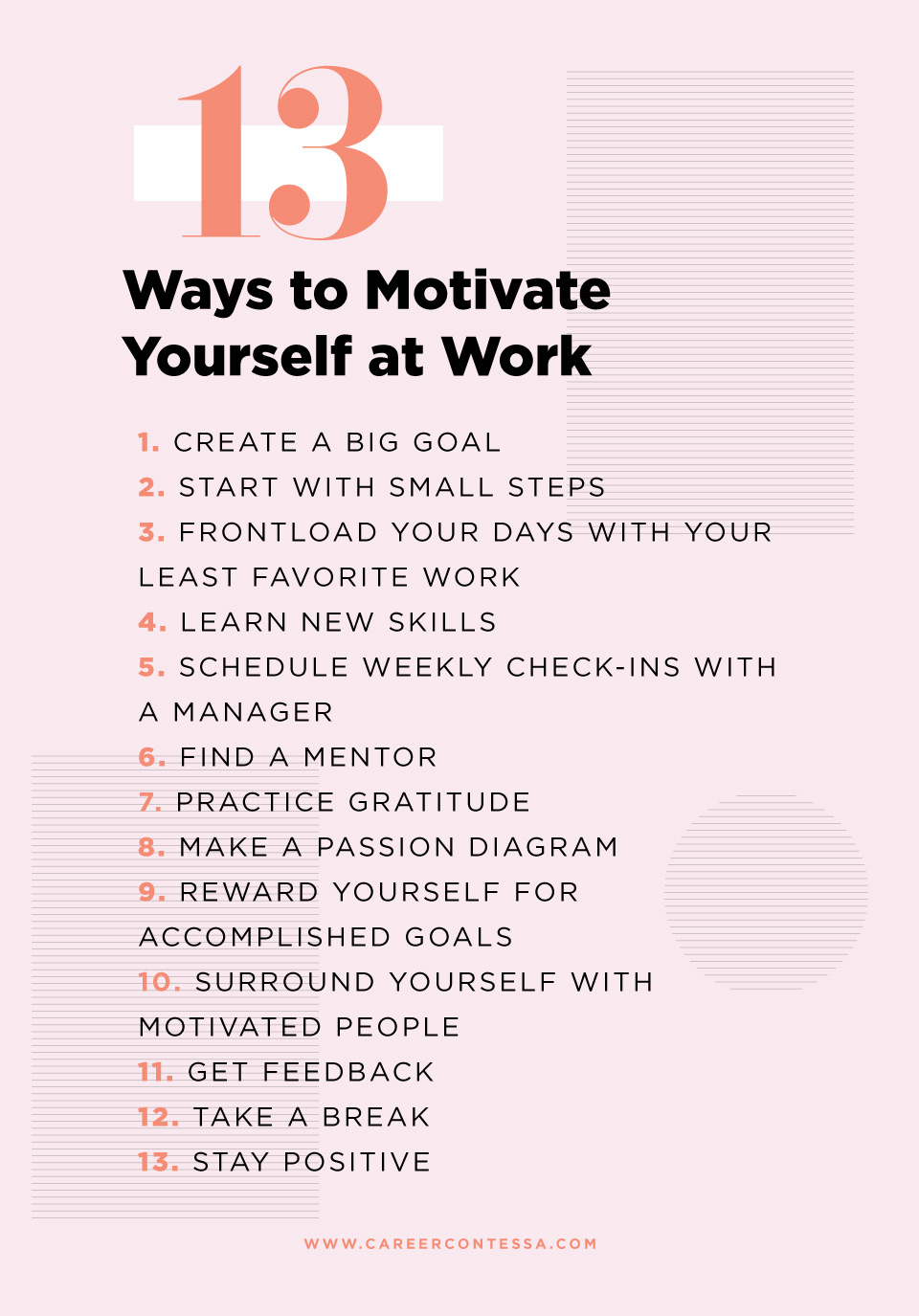Remember your first day of work in your new job?
You were probably so excited about your new position—chock full of ideas and inspiration. You couldn't wait to show everyone your excellence. Fast forward 1,000 days later.
The lack of motivation hits—and it hits hard.
What happened to all that
Monday motivation you came blazing through the doors with? Do you feel beaten down by your day-to-day routines? Are the
motivational quote post-its falling off your monitor? And worst, have all of your brilliant ideas fallen by the wayside?
Before we dive into how to re-motivate, let's identify why you may have lost your steam. After a few years on the job, it's easy to lose motivation.
Intrinsic motivation comes from internal drive, but what makes up your internal drive?
- Physiological
- Safety
- Love/Belonging
- Esteem
- Self-actualization
It happens to all of us. It can be difficult to lose your joie de vivre at work. However, that doesn't always mean it's time to move on and start a harrowing job search.
First Things First: Keep in Mind That It Might Not Be You at All
Sometimes your lack of motivation doesn't really have anything to do with you. It could be bad leadership in the form of a new boss you dislike. It could be that the
work environment is toxic or that it doesn't fit your life anymore. Maybe it's that you've repeatedly asked for compensation that matches your job role and accomplishments, only to be denied.
Remember that you don't need to change yourself to fit a job.
If your workplace was once a positive working environment, but it has changed for any number of reasons, it might mean that it's time for you to move on in order to regain that job satisfaction and workplace motivation that you once held.
If that's not the case, well, phew! Here are a few ways to get your spark back at work.
1. Create a Big Goal
Here's the tricky part. Don't get overwhelmed by your "big goal." In fact, as soon as you set your big goal, break it up into smaller goals—and go from there. By breaking your goals into manageable pieces, you're less likely to lose momentum because you are watching your progress unfold, little by little.
With our next few steps, we unwrap ways to work towards this larger goal with motivational boost ideas, short-term celebrations, and positive affirmations to get you through.
2. Start With Small Steps
The key to good old work motivation is goals that are SMART.
If you're taking the steps to
make SMART goals, you'll start with the specific. Specific goals are much more achievable, because all of the framework is in place from the starting line.
To set the specificity of your goals, let's start with the five Ws.
- Who: Who is involved in this goal?
- What: What do I want to accomplish?
- Where: Location of goal.
- Why: What's the specific reason, purpose, or benefit from setting this goal?
- When: What's the time frame in which I want to achieve this goal?
By breaking up a large goal into smaller pieces, you can intentionally chip away at your larger goal, piece by piece.
3. Frontload Your Days With Your Least Favorite Work
We all have days when we get bogged down by details. We all have days where we dread one big task and use all of our energy simply dreading it.
We all have work that we don't like. That's why it's called work. This is advice we all need to write on a post-it and stick to our monitors.
Do your least favorite work first. When you let
your to-do list pile up with tasks that you despise doing, it can turn into a motivation killer. Start your day by ticking annoying, repetitive, or labor-intensive tasks off of your to-do list. Give your worst work a little joy by queuing up
your favorite podcast.
Instead of repeatedly pushing it to the side, get the work done—and get back to doing what you love to do.
4. Learn New Skills
When was the last time you
learned an entirely new skill? If this question brings you back to your first weeks at work or worse—your undergraduate career—it might be time to learn a new skill.
There are plenty of places to learn new work-related skills. Maybe this is the day you finally take that UX design class. Go for it. Inquire as to whether your company has educational stipends—and take full advantage of them!
5. Schedule Weekly Check-Ins With Your Manager
If you're really struggling with motivation at work, maybe it's time for a
job makeover. That doesn't mean you need a new job—it might just mean you need to re-work your responsibilities and workload with your boss.
These 1:1s don't have to last forever. Come into the first meeting with a game plan. Voice your concerns, make some tentative plans, and arrive with an open mind for
feedback and direction.
6. Find a Mentor
Here at Career Contessa, we are all about
mentorship. Find a mentor within your industry and swap stories. A great mentor will have actionable advice on how to propel your career forward.
Whether you want to eventually move up in your company, take your current position to the next level, amp up your skills, or make a big career pivot—there's a
mentor out there for you.
7. Practice Gratitude
Sometimes the hardest part is knowing what you do have. We get some bogged down by constantly moving the goal post and finding new destinations—instead of embracing where we are and what we do have.
You have a job. You're receiving a paycheck and benefits (or, at least you should be!).
Try to
shift your perspective. Rather than drudging through
another Tuesday, recognize the good things about your job, your company, and your coworkers.
8. Make a Passion Diagram
Here's a fun one for you. Let's get together to make a passion diagram. What do you love to do? Is it writing? Do you love burying yourself in research?
By creating a passion diagram, you create a visual representation of what you love to do, what you do at work, and the places in which the two might intersect. If you're not happy with the intersection—or if there is no intersection at all—find ways to infuse your job with more of what you love.
For example, if you love to take photos but you're a copywriter, reach out to your social media team. Is there any help they need in creating stories or other content?
Find ways to marry what you love doing with your day-to-day work.
9. Reward Yourself for Accomplished Goals
We've been talking about this point a lot lately—and we're guilty of it, too. Make space for
your achievements, your milestones, and all the small successes in between. Every human being likes a little reward to boost morale and stay motivated.
We all need to slow down for a second and celebrate our accomplishments. This doesn't mean skipping out of work for bottomless margaritas because you surpassed your monthly traffic goal. Rather, it's taking a beat—and
sharing the news with another coworker, your mom, or your significant other.
We work hard every day. It's easy to get so lost in a
comparison trap and forget to celebrate our own accomplishments. Try it out. Go back over your last year and point out your accomplishments. What did you achieve in your first three months at your position? Your first six months? Take note. It's never too late to celebrate—even retroactively.
But seriously, get in the habit of celebrating—or at least acknowledging—your successes. Write them down. Share them. Give yourself the pat on the back that you deserve.
10. Surround Yourself With Motivated People
We all know that misery loves company. If you're feeling unmotivated at work, there's a pretty big chance that you've already complained about it aloud—maybe even to a colleague.
Avoid the work colleagues that tend to neg on the company. Better yet, challenge their negativity with a positive reply. See if you can channel positivity from a throwaway negative comment.
Surround yourself with the coworkers who are motivated and lively. Bounce ideas off each other, and work together on new and exciting projects.
Start a club or organization to foster more inter-team collaboration.
11. Get Feedback
Feedback, especially from your boss, is one of the most valuable extrinsic motivators.
Make the time to get feedback—whether from your manager, a coworker, or maybe a mentor within your industry. Examining your frustrations with someone else could (and usually does) give you perspective on what you can do to improve or change your outlook.
12. Take a Break
Actually, chances are that it's been time for a break and you were too busy to notice. Your vacation days are as important as your deadlines.
Maybe it's a break from the industry you're in,
the toxic work culture you're experiencing, or maybe it's as simple as finally taking those vacation days. Heck, it might be as simple as turning your phone off for three hours on a Saturday. Give yourself permission to
take a break—then take it.
Taking time—whether on vacation or a hiatus from work—is like taking a long shower. Suddenly, your thoughts become clearer and more lucid. By giving yourself a break, you can open yourself to ideas and inspiration you were simply too busy to see.
13. Stay Positive
This should probably be tip number one.
Keep positivity around your work. This does not mean that you should ignore toxic elements of your workplace, mistreatment, or
the signs of incoming burnout. It's more about keeping your state of mind positive when it's within your control.
It's shifting at least some of your
external motivation to be more intrinsic. This means that your motivation comes from within yourself—not from fear of being fired, missing out on external rewards, getting demoted, or disappointing your boss.
Some actionable ways to keep positive include:
- Steering clear of negative folks who like to "live" in negativity
- Reframing intrusive negative thoughts with positive change action
- Steering clear of gossip or regular "venting" at work
- Finding ways to infuse what you love into your work
- Keeping an eye on your mental health and physical health (in good times and in bad times)
- Creating personal goals related to happiness, fulfillment, creativity, and learning
Remember that you are in control of your career—only you can make the changes to reward and stimulate you both professionally and personally. You've got this.














